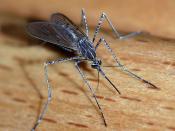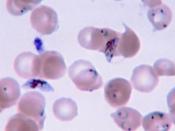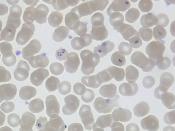Introduction
Mosquitoes: the carrier of disease, the sultan of annoyance, the clever anti-coagulants its whiner makes so the blood you have will flow freely into its gut. Sounds innocuous to most but deadly to others. Do not speak about the mosquito's mouth, which is designed to furtively slip through human flesh. Nothing about the itchy feeling as the body tries to decompose and eliminate chemicals the mosquito (refer to appendix a) injected during the bite. Not a word about the grave diseases that could be caught from the mosquito: West Nile, encephalitis, yellow fever, dengue, malaria, etc. Despite an occasional case of malaria and yellow fever in non-tropical locations like Michigan and New York City, and the spread of West Nile virus across parts of the United States, most people in temperate climates view mosquitoes as a nuisance.
Malaria
The Disease Itself
Malaria is one of the world's most serious infectious diseases.
Malaria is an ancient disease caused by a blood-borne parasite that infects and then destroys red blood cells. Malaria victims can suffer repeated episodes of fever, or anemia or death. "After years of decline, malaria is on the move, and despite the recent headlines given to the "catch-me-you're-dead" Ebola virus (Refer to appendix a), it's malaria that counts its victims in the millions: The disease infects about 400 million people each year."
The malaria parasite infects and kills red blood cells, which carry oxygen from the lungs throughout the body. Here's how the anopheles (female) mosquito and the malaria parasite work together to cause malaria:
As a female anopheles mosquito with the parasite drinks its small amount of blood, it transmits many threadlike structures (called sporozoites) into the new host.
These sporozoites travel to the liver, where they multiply and form another kind of spore, called a...


